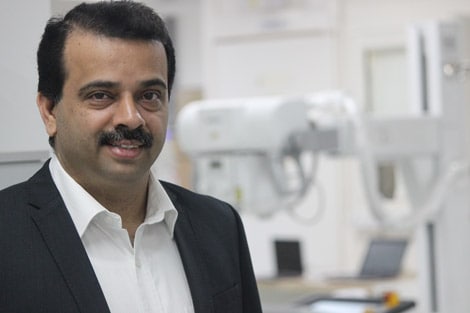A global approach to fulfilling local needs


Name: Radhakrishnan Kodakkal
Role: Global R&D Leader Diagnostic X-Ray
Location: India
My name is Radhakrishnan and I’ve been with Philips for 10 years. Every day I wake up looking forward to the myriad challenges of leading Global R&D for the Diagnostic X-Ray business. Never a dull day at my workplace! Innovation strategy, new product development, and lifecycle maintenance keeps me on my toes. R&D sites across India, Germany, China and Brazil - a total of 5 locations, including two in India – fall under my purview.
Freedom and flexibility Looking back, it was my undergraduate studies in Instrumentation Engineering that triggered a strong curiosity about biomedical instrumentation. After graduation, I was on the lookout for the chance to use my engineering skills to create a positive social impact. My career began in the automation industry – soon after, in 1998, I moved to the Netherlands as a consultant. Philips was one of my clients, and I happily immersed myself working with innovations in biomedical devices. Yes, innovations that save people’s lives! I worked as a consultant for Philips Healthcare for many years before I joined Philips as an employee in 2007. Philips gives a lot of freedom and flexibility in career progression. My first role in Philips was in system design in the Cardio Vascular Business Unit, something quite different from my previous role. Since then every role over the years had something new and different. At Philips, if you demonstrate your capability and potential, many different paths open up for you!
Addressing unmet healthcare needs In the past Philips focused on premium products in Healthcare – it had great products for big, corporate hospitals. However, Philips did not have products for the value segment of the market and access to small hospitals in tier-2, tier-3 cities and small towns. In places like these, high-quality medical equipment isn’t easy to access. Imagine a person with cardiac arrest in a remote location in India, the “Golden hour”, in which his life can be saved is within 60 to 90mins., accessing a good healthcare facility to treat him within this time is a challenge. To address this problem, Philips acquired two small, family-owned companies (Alpha X-Ray Technologies and Meditronics Healthcare). I was privileged to take the role as Business Integration Leader and returned back to India in 2009. My responsibility was to integrate these two companies and create an Innovation footprint to drive the growth for these products. This became the Healthcare Innovation Centre (HIC) Pune and we released our first Value Cathlab to the market in 2010.
Emerging Markets to Global Today, HIC Pune is the only centre in India where medical imaging products are conceptualized, designed, manufactured, marketed and delivered globally; it’s a completely end-to-end innovation hub. It started as a centre to develop value-segment products for Emerging Markets. Now some of the premium products are being designed in Pune and delivered across globe. I am proud to have played a pivotal role in this! Empowerment to explore My first impression of Philips was that it’s a traditional, conservative, centrally-managed company that wouldn’t be open to exploring outside of Europe. Certainly, things like HIC were not what I thought Philips would invest in. But they did. And not only did Philips make a serious commitment to India; they also gave me full empowerment. As happens in large global companies, a strategic plan is set by global management; however, within that, you are completely empowered to do what needs to succeed in new segments. It has not been easy. The integration of our acquisitions was tough. But, it taught me to be open to failure, to correcting mistakes, and to persist. One example I believe reflects this is the successful launch of our Surgery product, BV Vectra. My team and I saw this product from the concept till commercialization. Further, while the product was initially only meant for emerging markets, it also became apparent that it was required in more developed markets as well. This increased the performance expectation for the product. We achieved this with a team, where many did not have experience of end to end product creation. But what the team lacked in experience they made it up with talent and persistence. We had many technical issues in the early part of product development. With strong focus and perseverance the team in Pune were able to resolve the teething issues. It is incredibly fulfilling that we have sold large volume of BV Vectra systems across the globe. Relentless focus on quality, reliability and performance was key to success. Global reach, global teams Since August 2017 I have moved to a global role, still operating out of Pune but with time sharing at other locations. I am privileged to lead the Diagnostic X-Ray team in Germany, China, India and Brazil. The teams from different geography have different working styles, cultures and strengths. All sites work together to get innovative products to the market. What unites us is the success stories from our customers, which remind us that we are working to make healthcare more accessible across the world.
Persisting through challenges
To learn more about what it’s like to work at Philips, visit careers.philips.com/in/en or sign up to our newsletter. ©Philips 2018. All rights reserved.
